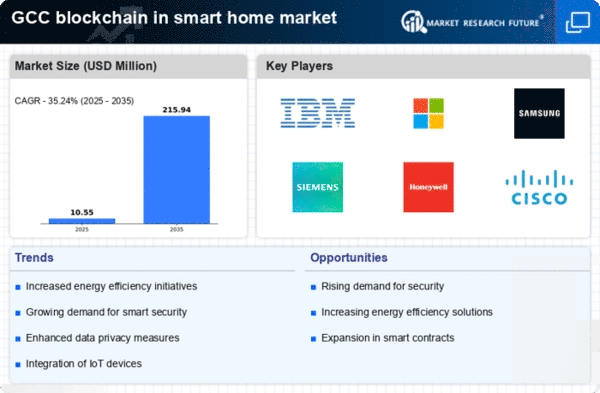Rising Cybersecurity Concerns
Rising cybersecurity concerns among consumers and businesses are driving the blockchain in-smart-home market. As smart home devices proliferate, the risk of cyber threats increases, prompting a demand for robust security solutions. Blockchain technology, with its inherent characteristics of decentralization and immutability, offers a promising approach to enhance the security of smart home ecosystems. In the GCC, where the number of connected devices is expected to exceed 50 million by 2025, the need for secure communication channels becomes paramount. This growing awareness of cybersecurity risks is likely to accelerate the adoption of blockchain solutions in smart homes, as they provide a secure framework for device interactions and data management.
Consumer Awareness and Education
Consumer awareness and education regarding the benefits of blockchain technology are crucial drivers for the blockchain in-smart-home market. As consumers become more informed about the advantages of blockchain, such as enhanced security, privacy, and control over personal data, the demand for blockchain-enabled smart home solutions is likely to increase. Educational initiatives by industry stakeholders, including workshops and online resources, are helping to demystify blockchain technology for the average consumer. In the GCC, where digital literacy is on the rise, this growing awareness may lead to a more significant adoption of blockchain in smart home applications, ultimately shaping the future landscape of the market.
Growing Demand for Smart Home Automation
The increasing demand for smart home automation in the GCC region is a primary driver for the blockchain in smart home market. As consumers seek enhanced convenience and control over their living environments, the integration of blockchain technology offers a secure and efficient means to manage smart devices. According to recent estimates, the smart home market in the GCC is projected to reach approximately $10 billion by 2026, with a compound annual growth rate (CAGR) of around 25%. This growth is likely to propel the adoption of blockchain solutions, as they provide a decentralized framework that enhances device interoperability and data security, thereby addressing consumer concerns regarding privacy and control.
Regulatory Support and Government Initiatives
Regulatory support and government initiatives in the GCC are fostering the growth of the blockchain in-smart-home market. Governments in the region are increasingly recognizing the potential of blockchain technology to enhance transparency and security in various sectors, including smart homes. For instance, initiatives aimed at promoting smart city developments often incorporate blockchain solutions to streamline operations and improve service delivery. The UAE government has launched several initiatives to integrate blockchain into public services, which may indirectly boost the adoption of blockchain in smart home applications. This supportive regulatory environment is likely to encourage investments and innovations in the blockchain in-smart-home market.
Increased Investment in Smart Home Technologies
Increased investment in smart home technologies is significantly impacting the blockchain in-smart-home market. Venture capital and private equity firms are increasingly funding startups and established companies that focus on smart home innovations, including those leveraging blockchain technology. In 2025, investments in smart home technologies in the GCC are projected to surpass $1 billion, reflecting a strong interest in enhancing home automation and security. This influx of capital is likely to drive research and development efforts, leading to the creation of advanced blockchain solutions tailored for smart home applications. As a result, the blockchain in-smart-home market may experience accelerated growth due to these financial commitments.

















